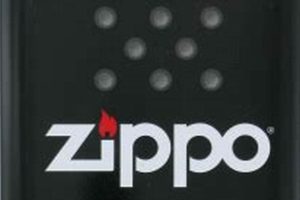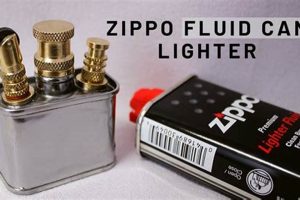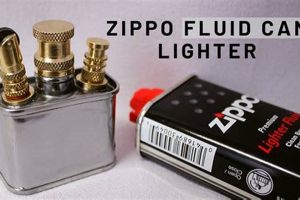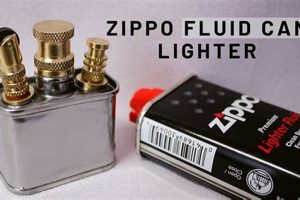Zippo lighters are designed for optimal performance with a specific type of petroleum distillate fuel. While other lighter fluids may seem similar, variations in chemical composition and purity can negatively impact the lighter’s function. Using an unsuitable fuel can lead to clogging of the wick, inconsistent flames, and even damage to the internal mechanisms over time. An example of this would be using a heavier fluid intended for torches, which can leave behind residue that obstructs the fuel flow.
Maintaining a Zippo lighter with the correct fuel ensures its longevity and reliability. The recommended fuel is formulated to burn cleanly and consistently, minimizing the buildup of deposits that can hinder performance. This dedication to proper fuel usage contributes to the enduring reputation of Zippo lighters as dependable and long-lasting tools. Historically, Zippo has emphasized the importance of using their specific fuel for optimal performance since the company’s inception.
This article will further explore the intricacies of lighter fuels, delving into the specific properties of various types and their compatibility with Zippo lighters. It will also provide guidance on proper filling techniques and maintenance procedures to ensure optimal performance and longevity of these iconic lighters.
Tips for Fueling a Zippo Lighter
Proper fueling is essential for optimal lighter performance and longevity. These tips provide guidance on selecting and using the correct fuel.
Tip 1: Select lighter fluid specifically designed for Zippo lighters. This specialized fuel is formulated to burn cleanly and consistently, minimizing residue buildup.
Tip 2: Avoid using generic lighter fluids or those intended for other purposes, such as torches. These fuels may contain impurities or additives that can clog the wick and hinder performance.
Tip 3: Fill the lighter in a well-ventilated area, away from open flames or sparks. This precaution ensures safety during the fueling process.
Tip 4: Saturate the cotton packing inside the lighter, but avoid overfilling. Overfilling can lead to leakage and fuel waste.
Tip 5: Wipe away any excess fuel from the exterior of the lighter after filling. This prevents accidental ignition and keeps the lighter clean.
Tip 6: Allow the lighter to sit upright for a few minutes after filling before igniting. This allows the fuel to properly saturate the wick and prevents flooding.
Tip 7: Store lighter fluid in a cool, dry place away from direct sunlight and heat sources. Proper storage maintains fuel quality and prevents evaporation.
Adhering to these fuel selection and handling guidelines ensures reliable lighter operation and extends its lifespan.
By understanding the importance of proper fuel usage, one can appreciate the enduring quality and performance of a well-maintained Zippo lighter.
1. Zippo-specific Fuel
The query “can I use normal lighter fluid in a Zippo?” directly relates to the importance of Zippo-specific fuel. This specialized fuel is formulated for optimal performance within the lighter’s intricate mechanism. Using generic lighter fluids, while seemingly a practical alternative, can lead to detrimental consequences. The difference lies in the chemical composition. Generic lighter fluids may contain impurities or additives not present in Zippo fuel. These variations can disrupt the delicate balance within the lighter, leading to a range of issues. For example, heavier generic fluids can leave residue, clogging the wick and hindering fuel flow. This residue buildup, over time, can permanently damage the lighter’s internal components, reducing its lifespan and reliability.
The practical significance of using Zippo-specific fuel becomes evident in the lighter’s long-term performance. A Zippo fueled correctly burns cleanly and consistently, providing a reliable flame when needed. Conversely, using an unsuitable fuel can result in inconsistent flames, requiring frequent adjustments and potentially leading to frustrating failures. Imagine relying on a lighter in a crucial moment, only to find it sputtering and unreliable due to the use of an incorrect fuel. Such scenarios underscore the practical importance of adhering to the manufacturer’s recommendations. Furthermore, the investment in Zippo-specific fuel ultimately protects the longevity of the lighter, a testament to the brand’s reputation for durability.
In conclusion, while the temptation to use generic lighter fluid might arise due to cost or availability, the potential repercussions outweigh any perceived benefit. Zippo-specific fuel, engineered for the intricacies of the lighter’s design, ensures optimal performance and longevity. Understanding this connection directly addresses the core question of fuel compatibility and highlights the importance of adhering to manufacturer guidelines for a consistently reliable and enduring lighter experience.
2. Optimal Performance
Optimal performance in a Zippo lighter hinges directly on the type of fuel used. The question, “can I use normal lighter fluid in a Zippo,” underscores a critical factor influencing this performance. Cause and effect are clearly linked: using an unsuitable fuel can lead to suboptimal functionality. The specific formulation of Zippo premium lighter fluid ensures consistent ignition, a steady flame, and minimizes residue buildup within the lighter’s mechanism. Using generic lighter fluids, often formulated with different chemical properties and potentially containing impurities, can disrupt this delicate balance. A real-life example includes the use of a thicker, generic lighter fluid leading to a clogged wick, hindering fuel flow and resulting in an inconsistent or weak flame. This directly compromises the lighter’s intended function and reliability.
The importance of optimal performance as a component of fuel selection cannot be overstated. A Zippo lighter, renowned for its durability and dependability, relies on the correct fuel to fulfill its intended purpose. Consider a scenario where a reliable flame is needed in adverse weather conditions a poorly performing lighter due to incorrect fuel could prove ineffective and even dangerous. Practical applications extend beyond mere convenience; they encompass safety and reliability in various situations. The longevity of the lighter is also impacted. Consistent use of the correct fuel contributes to the long-term health of the lighter’s internal mechanisms, preventing premature wear and tear caused by residue buildup from incompatible fuels. This translates to a longer lifespan and sustained optimal performance over time.
In summary, optimal performance is intrinsically linked to fuel selection in a Zippo lighter. Addressing the question of fuel compatibility highlights the potential consequences of using unsuitable alternatives. The practical implications, ranging from reliability in demanding situations to the lighter’s overall lifespan, underscore the significance of using the recommended fuel. Choosing Zippo premium lighter fluid directly contributes to consistent ignition, a steady flame, and ultimately, the enduring performance expected from this iconic lighter.
3. Generic Lighter Fluids
The question “can I use normal lighter fluid in a Zippo?” often arises from the availability and perceived interchangeability of generic lighter fluids. However, this assumption overlooks critical distinctions between generic options and Zippo’s specialized fuel. A cause-and-effect relationship exists between the type of fuel used and the lighter’s performance. Generic lighter fluids possess varying chemical compositions, often including additives and impurities absent in Zippo premium lighter fluid. These variations can lead to undesirable consequences, including clogged wicks, inconsistent flames, and the buildup of residue within the lighter’s mechanism. A practical example illustrates this point: using a generic fluid containing a higher concentration of volatile compounds can result in rapid fuel evaporation, requiring more frequent refills and potentially damaging the lighter’s seals over time.
Understanding the role of generic lighter fluids within the broader context of Zippo maintenance is crucial. While generic options may appear cost-effective, potential long-term damage outweighs any short-term savings. A clogged wick, resulting from the use of an unsuitable fuel, not only hinders performance but also necessitates cleaning or replacement, potentially involving disassembly of the lighter. Furthermore, residue buildup from incompatible fuels can affect the lighter’s internal mechanisms, leading to malfunctions and reduced lifespan. Consider a scenario where a reliable flame is crucial, such as in outdoor activities or emergencies; a malfunctioning lighter due to the use of generic fluid can have significant practical implications. These potential consequences highlight the importance of using the correct fuel as a preventative measure against damage and performance issues.
In conclusion, the seemingly simple question of fuel compatibility reveals a complex interplay between fuel composition and lighter functionality. While generic lighter fluids might appear as viable alternatives, the potential for damage and diminished performance underscores the importance of using Zippo premium lighter fluid. This specialized fuel safeguards the lighter’s intricate mechanism, ensuring consistent performance and longevity. Recognizing this connection empowers users to make informed decisions regarding fuel selection, ultimately preserving the reliability and lifespan of their Zippo lighters.
4. Potential Damage
The seemingly innocuous question, “can I use normal lighter fluid in a Zippo,” carries significant implications regarding potential damage to the lighter’s intricate mechanism. A direct cause-and-effect relationship exists between the type of fuel used and the long-term health of the lighter. Zippo premium lighter fluid is specifically formulated to minimize residue buildup and ensure smooth operation. Conversely, generic lighter fluids, often containing varying chemical compositions and potentially higher levels of impurities, can lead to a range of problems. These can include clogged wicks, hindering fuel flow and producing inconsistent flames. Furthermore, the buildup of residue within the lighter’s casing can obstruct moving parts, leading to malfunctions and potentially irreversible damage. A practical example illustrates this: using a generic fluid with a higher viscosity can leave a sticky residue within the fuel chamber, attracting dust and debris, further exacerbating the clogging issue and hindering the lighter’s performance.
The potential for damage as a direct consequence of using incorrect fuel forms a crucial component in understanding the importance of fuel selection. A Zippo lighter, renowned for its durability, can suffer premature wear and tear due to the use of incompatible fuels. This damage translates to reduced lifespan, compromised functionality, and potentially costly repairs. Consider a scenario where a lighter fails to ignite in a critical situation due to a clogged wick caused by improper fuel usage the practical implications can range from inconvenience to potential safety hazards. Moreover, the corrosive properties of certain chemicals present in some generic lighter fluids can degrade the lighter’s internal components over time, leading to irreversible damage and ultimately rendering the lighter unusable. This underscores the importance of preventative maintenance through the use of the correct fuel.
In summary, understanding the potential for damage resulting from the use of generic lighter fluids is paramount for preserving the functionality and longevity of a Zippo lighter. While the temptation to use readily available alternatives might exist, the long-term consequences outweigh any perceived short-term benefits. Choosing Zippo premium lighter fluid directly mitigates the risk of damage, ensuring the lighter performs reliably and consistently throughout its intended lifespan. This informed approach to fuel selection safeguards the investment in a quality lighter and upholds the brand’s reputation for enduring performance.
5. Clogged Wicks
Clogged wicks represent a significant consequence of using improper fuel in Zippo lighters, directly relating to the question of whether standard lighter fluid is suitable. A cause-and-effect relationship exists: using generic lighter fluids, often formulated with different chemical compositions and potentially containing impurities, can lead to wick clogging. These impurities can leave residue within the wick’s fibers, restricting fuel flow and hindering the lighter’s ability to ignite consistently. Imagine attempting to light a campfire in damp conditions with a lighter suffering from a clogged wick the frustration and inconvenience underscore the practical implications of this issue. This scenario exemplifies how using the incorrect fuel can compromise the lighter’s reliability in critical situations.
The importance of understanding wick clogging as a component of proper Zippo maintenance cannot be overstated. A clogged wick not only affects the lighter’s immediate functionality but also contributes to long-term performance issues. Restricted fuel flow can lead to inconsistent flames, requiring frequent adjustments and potentially causing the lighter to fail when needed most. Furthermore, a clogged wick can necessitate more frequent cleaning or even replacement, adding to maintenance efforts and potentially shortening the lighter’s lifespan. Consider a craftsman relying on a Zippo for detailed work a consistently reliable flame is essential for precision and efficiency. A clogged wick, disrupting this workflow, highlights the practical implications of improper fuel usage within professional contexts.
In conclusion, clogged wicks represent a tangible and detrimental consequence of using inappropriate lighter fluid in Zippo lighters. This issue extends beyond mere inconvenience, impacting reliability, maintenance requirements, and overall lighter longevity. Understanding the direct link between fuel selection and wick health empowers users to make informed decisions, ensuring consistent performance and preserving the lifespan of their Zippo lighters. Addressing the question of fuel compatibility through the lens of wick clogging provides practical insights into maintaining these iconic lighters and ensuring their reliable operation in various situations.
6. Inconsistent flames
Inconsistent flames in a Zippo lighter often directly correlate with the type of fuel used, addressing the core query of using standard lighter fluid. A cause-and-effect relationship exists: unsuitable fuels can disrupt the carefully engineered combustion process within the lighter. Zippo premium lighter fluid is formulated for optimal vaporization and burning, producing a consistent, reliable flame. Generic lighter fluids, however, may possess different chemical properties, leading to uneven vaporization and resulting in flickering, sputtering, or even extinguished flames. Imagine relying on a lighter for a critical task in challenging conditions, only to be met with an unreliable, fluctuating flame the practical implications of this inconsistency become immediately apparent.
The importance of consistent flames as a performance indicator cannot be overstated. A reliable flame is paramount for a multitude of tasks, from lighting a cigarette in windy conditions to igniting a campfire. Inconsistent flames introduce an element of unpredictability, compromising the lighter’s functionality and potentially posing safety risks. Consider a scenario where a steady flame is required for a delicate task, such as lighting a pilot light an inconsistent flame can not only hinder the process but also create a potential hazard. The practical significance extends beyond mere convenience, encompassing safety and reliability in diverse applications. Furthermore, inconsistent flames can indicate underlying issues, such as a partially clogged wick or contaminated fuel, highlighting the importance of using the correct fuel as a preventative maintenance measure.
In summary, inconsistent flames serve as a direct indicator of potential fuel incompatibility in Zippo lighters. This issue transcends mere inconvenience, impacting functionality, reliability, and even safety. Understanding the direct correlation between fuel type and flame consistency empowers users to make informed decisions regarding fuel selection. Choosing the correct fuel ensures a consistent, dependable flame, maximizing the lighter’s utility and upholding the brand’s reputation for reliable performance.
Frequently Asked Questions
This section addresses common inquiries regarding fuel compatibility with Zippo lighters, clarifying potential misconceptions and providing concise, informative answers.
Question 1: What are the potential consequences of using generic lighter fluid in a Zippo lighter?
Generic lighter fluids can negatively impact a Zippo’s functionality due to varying chemical compositions. Potential consequences include clogged wicks, inconsistent flames, reduced lifespan, and damage to internal components.
Question 2: Why is Zippo premium lighter fluid recommended?
Zippo premium lighter fluid is specifically formulated for optimal performance and longevity within Zippo lighters. Its refined composition minimizes residue buildup and ensures consistent, reliable ignition.
Question 3: Can using the wrong fuel void the Zippo warranty?
While using generic lighter fluid may not explicitly void the warranty, damage resulting from improper fuel usage may not be covered. Adhering to manufacturer recommendations ensures optimal performance and warranty coverage for eligible repairs.
Question 4: How does fuel choice affect the longevity of a Zippo lighter?
Using the correct fuel directly impacts a Zippo lighter’s lifespan. Zippo premium lighter fluid minimizes residue buildup, preserving internal components and promoting long-term functionality. Incompatible fuels can lead to premature wear and tear, reducing the lighter’s lifespan.
Question 5: Are there any safety concerns associated with using generic lighter fluids in a Zippo?
Generic lighter fluids may contain volatile compounds that can increase flammability or produce undesirable combustion byproducts. Using Zippo premium lighter fluid ensures predictable burning characteristics and minimizes potential safety risks.
Question 6: What should one do if generic lighter fluid has already been used in a Zippo?
If generic fluid has been used, it’s advisable to flush the lighter with Zippo premium lighter fluid. This helps remove any residue and restore optimal performance. If issues persist, professional cleaning or repair may be necessary.
Choosing the correct fuel is paramount for maintaining a Zippo lighter’s performance and longevity. Using Zippo premium lighter fluid ensures reliable operation and minimizes the risk of damage associated with incompatible fuels.
For further information on Zippo lighter care and maintenance, consult the official Zippo website or authorized service centers.
Can I Use Normal Lighter Fluid in a Zippo? – Conclusion
This exploration of lighter fluid compatibility has definitively addressed the question of whether standard lighter fluids can be used in Zippo lighters. Analysis reveals potential negative consequences associated with using generic lighter fluids, including clogged wicks, inconsistent flames, and potential damage to internal components. These outcomes compromise both performance and longevity, underscoring the importance of using fuel specifically formulated for Zippo lighters. Zippo premium lighter fluid’s specialized composition ensures optimal vaporization, consistent burning, and minimal residue buildup, preserving the lighter’s intricate mechanism and promoting long-term reliability. The difference between generic and specialized fuels translates directly to the lighter’s functionality, impacting its ability to provide a dependable flame when needed.
Maintaining a Zippo lighter’s performance and longevity requires adherence to manufacturer recommendations. Selecting the correct fuel is a fundamental aspect of this maintenance, directly influencing the lighter’s reliability and lifespan. Investing in Zippo premium lighter fluid safeguards the lighter’s intricate mechanism and ensures consistent performance. This informed approach to fuel selection reflects a commitment to preserving the quality and functionality of a precision instrument, ultimately maximizing its lifespan and upholding its reputation for enduring dependability.







